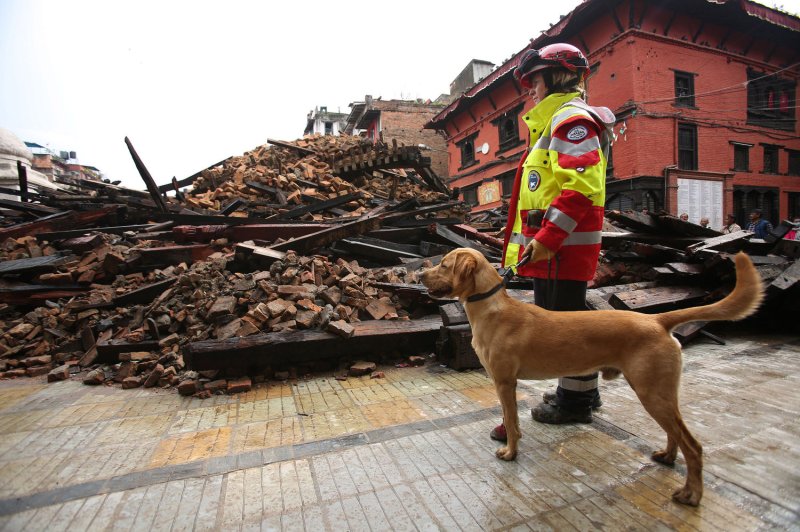A rescue team member along with a rescue dog search for the victims on the collapsed temple four days after the earthquake in Kathmandu, Nepal, April 28, 2015. Photo by Sanjog Manandhar/UPI |
License Photo
NEW YORK, April 29 (UPI) -- About 1.7 million children are in urgent need of aid in areas worst-affected by the 7.9-magnitude earthquake in Nepal that has killed more than 5,000 people.
UNICEF released its report as it launches a bid for $50.3 million in additional funding for humanitarian assistance to children and their families amid growing risk of disease outbreaks for the next 90 days.
Nearly 10,000 people have been injured by the earthquake and displaced tens of thousands more. UNICEF is currently working to deliver humanitarian assistance including shelter and clean water.
"The lives of so many children have been torn apart and they are in desperate need of life-saving support, including clean water, shelter and sanitation," UNICEF Nepal Representative Tomoo Hozumi said in statement.
"Without a safe water supply, waterborne diseases remain huge risks for children. Many families are struggling simply to protect themselves from the sun and rain and we only expect needs to grow in the coming days as we receive additional information from more remote areas and the full scale of the disaster becomes more apparent," he added.
The latest updates from UNICEF's response include:
• Tents, hygiene kits, water purification tablets and buckets have been dispatched to Gorkha for distribution, the area at the epicenter of the earthquake, where the presence of dead bodies poses the risk of disease outbreak. Vital supplies have also been dispatched to Kavre and Dhading.
• UNICEF is delivering water purification tablets, buckets and hygiene kits in Bhaktapur where only 1 in 5 people are estimated to have access to clean water.
UNICEF is also giving psychological support to children who may in in shock and helping identify and assist children who have been separated from their families.
More than 80 percent of health facilities in the five most severely affected districts have been extensively damaged, according to UNICEF. About 88 percent of schools in the districts affected by the earthquake have been either partially or fully damaged.















